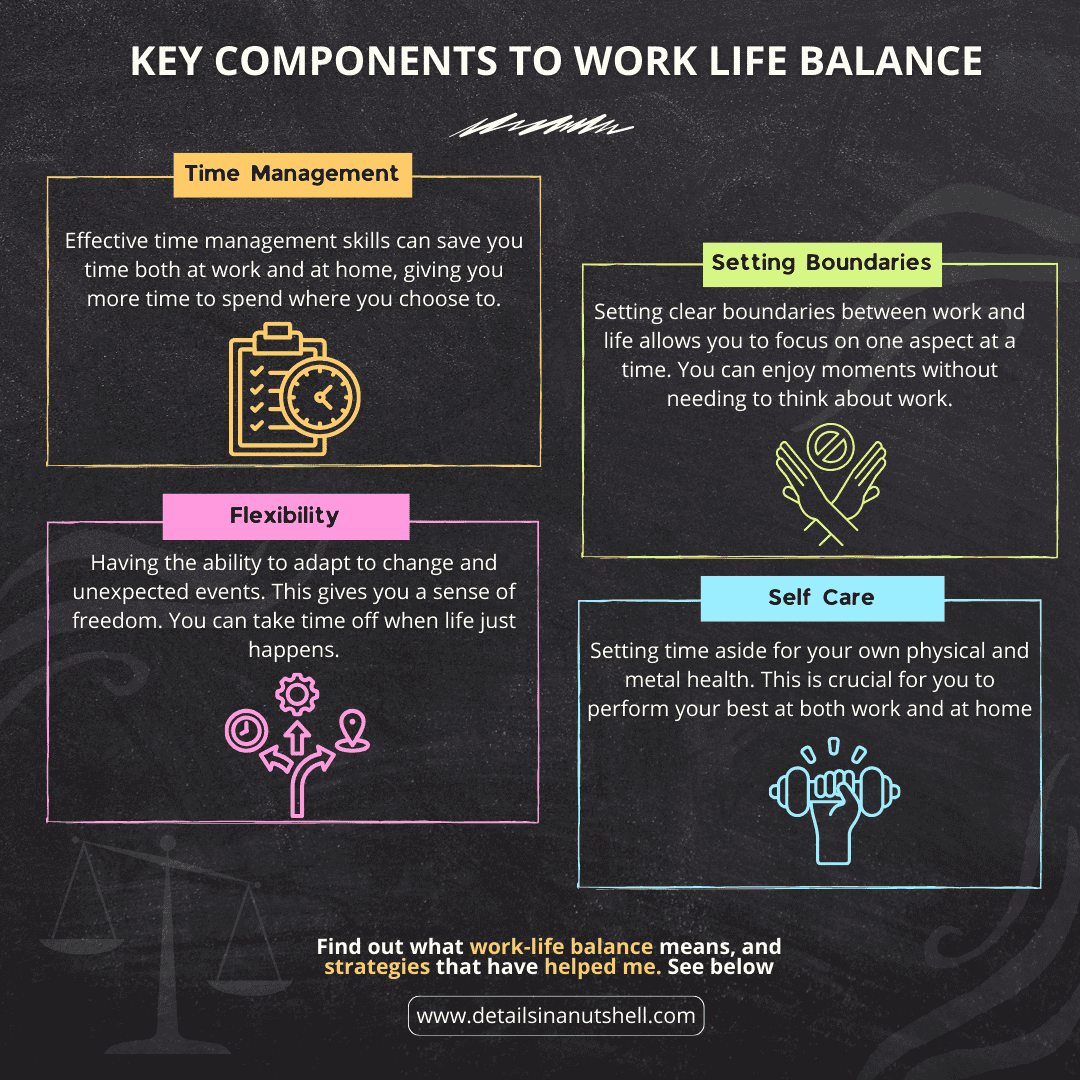IN A NUTSHELL..

Balancing career and family life isn’t about dividing time equally—it’s about making it work for you. Here’s how:
- 🕓 Time management – Optimize strategies
- 🛑 Setting boundaries – Protect personal time
- ↪ Flexibility – Adapt to life’s surprises
- 💪 Self-care – Recharge to give your best
It takes effort, but small adjustments can lead to a happier, healthier life. Reassess, refine, and find what works for you!
For personal stories and pro tips – more details below.
There are no affiliate links or sponsored products on this page.
Section Links
For the Busy Parent
Are you a busy parent struggling to juggle career and family life? Do you find it challenging to balance your professional responsibilities with quality family time? You’re not alone.
Being a parent is one of the most rewarding roles, but it comes with challenges, especially when trying to balance a career and family life. As a father of two energetic boys and a full-time engineering consultant, I know firsthand how tough it can be to find that balance.
In this three part series, I’ll share practical tips and strategies that have helped me manage my work-life balance, so you can spend more moments on what matters most to you.
The series will touch on the following:
Part 1: What is Work-Life Balance for Busy Parents (this post)
Part 2: Time Management Strategies for Parents
Part 3: How Self-Care Transforms Your Happiness
Imagine achieving a harmonious balance between your career and family life, where you can meet your professional responsibilities while still making time for your family and yourself. This series will provide you with the tools and insights to create a more fulfilling and balanced life.
What is Work-Life Balance
In a Nutshell:
- Achieving work-life balance involves meeting professional responsibilities while making time for family.
- Balance impacts personal well-being and family dynamics.
- Generating income is essential, but it’s important to find the right balance to avoid burnout.
Are you constantly torn between your work and family commitments? Do you feel like there’s never enough time for everything? Work-life balance might be the key to easing your stress and improving your overall well-being.
Work-life balance isn’t about splitting your time equally between work and family; it’s about finding a balance that works for you and your family. It means being able to meet your professional responsibilities while also making time for your family and yourself.
For parents, achieving this balance is crucial because it impacts both personal well-being and family dynamics. When you’re able to meet your work commitments and still have quality time with your family, it creates a more harmonious and fulfilling life.
In today’s harsh economic environment, generating income is more important than ever. As parents, we need to meet these obligations to provide and support our family—but that doesn’t mean it needs to be all work and no play. Remember, It’s about finding that right balance.
PROTIP #1
Sometimes its worth taking a step back to re-assess
If you are finding yourself working two jobs and a side hustle just to keep on top of expenditures, it may be a good time to step back and re-evaluate where your hard-earned money is being spent. Are you perhaps spending too much on things that you can actually do without? By re-assessing your spending’s you may be able to remove some of that burden on your shoulders.
In fact, according to studies highlighted in a post by Harvard Business Review, It was found that people were much happier if they have a life outside of work, and can earn the right amount of money to support it.
“…regardless of your circumstances, if you:
Ran Zilca, 2017 – Harvard Business Review
(1) have a life outside of work, and
(2) have the money to afford it –
you might be happier than you realize.”
When the work-life balance tilts too heavily toward work, there’s little time left to truly live. Conversely, if you devote too much time to personal pursuits, you may lack the means to sustain them. While it’s possible to live a content life without working, most of us want to avoid financial instability for our families sake —so we work.
So, how can we achieve this balance? Let’s explore some ideas to get you started.
Key Elements to Work-Life Balance
In a Nutshell:
Four key strategies that have helped me find my balance:
- Time Management: Use technology and prioritization to increase efficiency,
- Boundary Setting: Create clear boundaries between work and personal life to be present in each role.
- Flexibility: Being able to adapt to changes and unexpected events.
- Self-Care: Prioritize mental and physical health to maintain balance and well-being.
So, what are the secrets to managing work and family life effectively? There are many sources out there describing ways to navigate the complexities without tipping the scale. And its no easy feat, its not a one size fits all solution because every one of us are unique in our own way. It’s about trying things out until we find one that works.
Here are the strategies that have helped me on my journey, and hopefully, they can help you get started with creating a more balanced and fulfilling life. To me, there are four key elements to reach a right balance, and each of these influence the other to a certain degree.
1. Time Management
Effectively managing your time to meet both work and family obligations. This can be achieved through a a number of techniques like using technology to streamline tasks and prioritizing your daily activities to boost productivity.
This element is responsible for helping me get things done more effectively and efficiently, ensuring I can meet project deadlines, and have enough time to spend time with my kids.
We will explore these strategies in more detail in Part 2 of this series.
2. Boundary Setting
Creating clear boundaries between work and personal life. While this can broadly fall under a time management strategy, it’s important enough for me to consider it as a key element of its own.
Setting boundaries between work and home allows me to be present. I’m not thinking about a deliverable when I’m out with my family, or what my boys are eating during a client meeting. I know its harder for some to draw this line, especially if you are working from home often. Adding certain actions at the completion of one phase to another can help with the transition. For example, when I’m done with work for the day, I physically switch off my computer and leave the room. And when I start work each morning, I hug my kids and tell them to have a nice day and that i’ll see them after work.
3. Flexibility
The ability to adapt to change and unexpected events. Flexibility works both ways—sometimes it will favor family and life priorities, and other times, swing in the direction of work.
While its important to set clear boundaries, we all know that there are times where we need to work that extra hour to meet deadlines. Or something unexpected happens at home and you need take a day off to care for your family. That’s just the nature of the beast – and that’s where flexibility comes into play.
You don’t want to be too rigid to the point where if something unexpected happens, it throws your entire dat off. As Bruce Lee says, “be water”.
4. Self-Care
Take care of your mental and physical health to be at your best for both work and family.
If you aren’t taking yourself and recharging your batteries, you can’t be the best version of you for work or at home. This element is important because it’s the foundation that holds everything together. When you’re not in the right state of mind, nothing you do will be as effective or fulfilling as it could be. We will discuss more about self-care strategies in Part 3 of the series.
By focusing on balancing these elements, I’ve managed to achieve a good level of balance that makes me happy. Of course, if I had unlimited resources, then my work-to-play priorities might look a bit different, but the four elements above are still critical.
My Experiences
In a Nutshell:
Four key strategies that have helped me find my balance:
- Time Management: Preparation of lunchbox and clothes the night before eases chaotic mornings.
- Setting Boundaries: Establish a dedicated workspace and implement ‘quiet time’ for productivity during remote work.
- Flexibility: Having support from family and colleagues allows for adaptability in unexpected situations.
- Self-Care: Small acts of self-care, like unwinding each evening, are crucial for maintaining well-being and productivity.
Balancing work and family life can feel like a tightrope walk. But here are some personal stories I want to share which illustrate the challenges and rewards of finding this balance:
The Morning Rush (Time Management)
Mornings in our house can be chaotic. Getting my eldest son ready for school while preparing for an important work presentation can feel like a juggling act. One particular morning changed the way I do things to this day —it was a chaotic scene where everything seemed to go wrong.
Murphy’s Law: “Anything that can go wrong, will go wrong”
My eldest son couldn’t find his favorite shoes, the baby was cranky and needed extra attention, and I realized I hadn’t finished reviewing my presentation slides.

Amidst the hustle, I found myself scrambling to balance the act of getting my son out the door on time and keeping the baby from crying his eyes out. This experience taught me the importance of preparation. Now, we lay out clothes, pack lunches, and review schedules the night before bed. This small adjustment has made our mornings much smoother and given us precious moments of calm before the day begins.
Spending some time the night before preparing is a great way to keep keep ontop of things on a busy day and is one of the time management techniques that we’ll be discussing in the next part of the series.
PROTIP #2
Use a Scheduling or Family Calendars
Life gets busy and sometimes things that need to be done are forgotten. I recommend using a calendar app that helps you track all your upcoming activities, as well as your family commitments. You can make it a habit of checking it each night, or at the start of the week so you can prepare for what’s coming ahead. Find out what our family recommend here.
Work-from-Home (Setting Boundaries)
During the pandemic, working from home became the new norm. With two boys constantly seeking attention, I had to create a dedicated workspace and establish clear boundaries. We implemented a ‘quiet time’ rule during my critical work hours, and I took short breaks to spend time with them, which helped maintain my productivity and their happiness.
Fast forward 5 years and and I am still finding myself working from home for the most part, and the things we put in place back then are effective to this day. Of course, with my eldest now being in school, it’s naturally quieter than it once was!

Unexpected Sick Days (Flexibility)
Parenting is full of surprises, often at the most inconvenient times. One morning, just as I was about to start a busy work day, my youngest woke up vomitting with a fever. My wife was also coming down with something and needed help for the day. So I had to step in.
I quickly called work to explain the situation and asked a colleague if they could run a meeting I had scheduled in with a client later that day – they were happy to do so. With work sorted, I took my son to the doctor and stayed home to look after him.

It’s important to have flexible working arrangements and supportive family and colleagues. Their understanding and help allowed me to prioritize my son’s health without compromising my professional responsibilities. Of course, this flexibility works both ways and I’ve often stepped in to help others with.. well, situations where life just happens.
Prioritizing Self-Care (Self-Care)
Self-care often takes a backseat for busy parents, but I’ve learned its importance over time. After several weeks of non-stop work and family commitments, I found myself feeling worn out and overwhelmed.
Realizing I needed to take care of myself to be effective in both my roles, I started setting aside a bit of time each evening to unwind. This could be as simple as watching a show, playing a game, or spending a few minutes in meditation.
These small acts of self-care helped me recharge and approach each day with renewed energy. By taking care of myself, I found that I could be more present and attentive for my family and more focused and productive at work.
PROTIP #3
Time management and efficiency doesn’t mean no rest
While time management and and efficiency is important, it doesn’t mean you need to be so efficient that you remove all you self-care time. In fact if you don’t schedule in some of your own time, this will hurt your motivation and efficiency in long run and can lead to things like depression. Don’t believe me? Check out this post from Harvard Online.
Conclusion
Balancing career and family life can be challenging for busy parents, but it’s crucial for personal well-being and family harmony. Work-life balance isn’t about splitting time equally but finding a harmony that works for you and your family. By effectively working around my four key elements of time management, boundary setting, flexibility and prioritizing self-care, parents can create a more fulfilling life.
Finding this balance may take effort, but it’s worth it for a happier, healthier life. Embrace the journey and strive for a work-life balance that suits your unique needs and circumstances. And don’t forget, if you are finding yourself needing to work too hard or too many hours, take a step back and re-assess. Sometimes you can reduce the stress by simply balancing out your lifestyle. This can in turn can lead to a more fulfilling career and put you a step closer in achieving the right balance.
In the next part of this series, we’ll dive into some effective time management techniques that I use daily to work smarter. See you there!
Sharing Corner
I’m interested to hear how you find the right balance between work and family life. Please share these below as I’m sure we can all learn a thing or two from your experiences! If there is anything that resonates with you, I’d also like to hear about them.







